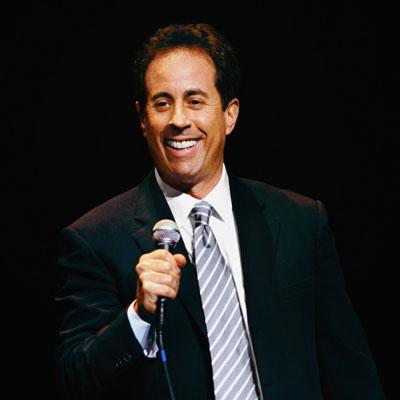Jerry Seinfeld at the Kennedy Center
By • September 21, 2012 0 1535

The guy in the really spiffy and expensive looking dark suit practically bounded onto the stage of the Kennedy Center’s Concert Hall while close to two thousand people cheered.
The man offered up that his name was Jerry Seinfeld and that he was 58 years old.
Seriously? Jerry Seinfeld? Fifty-eight years old?
Wow. This guy looked like he had more energy than Kramer busting through Jerry’s apartment door.
It was a funny—funny ha ha, very much, and funny strange, too—experience watching Jerry Seinfeld doing standup at the Kennedy Center. One of the neat things about it was that Seinfeld was cooly aware of it without beating his audience over the head with it. It’s fair to say that there were lots of people who watch Seinfeld re-runs—ka-ching for Jerry. Whenever we stumble across them, as we did recently with catching the infamously funny episode about being “master of your domain” and laughed helplessly once again as Kramer was the first to throw his money down.
We laughed helplessly again, as Seinfeld expertly speared contemporary pop culture, the smallest and therefore biggest human foibles we all share, with a somehow garrulous, almost hysterical approach. One of Seinfeld’s more obviously charming attributes is his ability to notice the obvious and point it out, as in taking on erectile dysfunction ads which have run rampant on the airwaves like bats flying out of a cave. Seinfeld took on one such ad, in which a couple is shown luxuriating in separate, stand-alone bathtubs in anticipation or remembrance of sex. It’s hard to tell which. “Who has two bathtubs?”, he screamed. “Do you know any couple that has two bathtubs and takes them to the beach with them? If they wanted to get turned on, wouldn’t it be better if they were in one bathtub?”
You’d think, but only Seinfeld managed to see the obvious flaw in the ad. And we laughed and laughed.
Seinfeld is famous for periodically returning to the stage to do stand up comedy, and going to clubs after he refused millions to take up the series he and Larry David created once more after the last one in 1998. No question, he’s a standup genius, talking about things we immediately recognize, us regular folks out there—teaching our kids to bust piñatas, playing the marriage Jeopardy Game and losing, noting how marriage instantly causes you to lose all your single friends, and vice versa.
We got our money’s worth, but even as we watched—and noticed that men are more restrained in their laughter than women, who snort and giggle with high-pitched abandon while poking the guys in the ribs, a fact Jerry might be able to use in a routine—the old Seinfeld shows slip in under your chin where the laughter starts.
If you check out a title list of old episodes sometimes, they’re not so much about “nothing,” but about the pre-ordained failure of the characters trying to make something out of “nothing.” They scheme big with little things—Kramer’s famous coffee table book with legs, for instance—and fail spectacularly, making the embarrassment hall of fame every time out.
Seinfeld himself has gone way beyond that, of course, but keeps up too, a fish in rarefied waters, still polishing his game, like Michael Phelps diving into the neighborhood pool unannounced. It’s a joy, really, to watch him and to recognize Seinfeld from “Seinfeld”.
Seinfeld was and remains a master wordsmith, knowing all the magic and power of words when you start bouncing them around like competing yo-yos, as in his start-up routine using the word “great” and bouncing it off “sucks” as in “you say life is really great”, but you know “life sucks,” which leads him right to the invention of pop tarts, which of course, changed everything. Seinfeld, in the show and maybe in the here and now, was always the gleeful ironist, the competitive nice guy, for whom irony can be used like a knife. He hasn’t lost his edge. He’s kind of intensely manic, in fact. As if these things, these small things make you roil, makes things matter, as opposed to the big things.
“Who are you voting for?” somebody from the audience shouted.
Much to the chagrin of the ghost of Mort Sahl, who would have spent two hours answering that question, Jerry shrugged it off with a wave.
“Who cares,” he says, and moved on to the next small-big thing we remember.

